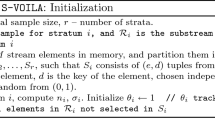Abstract
Traffic measurement and monitoring are an important component of network management and traffic engineering. With high-speed Internet backbone links, efficient and effective packet sampling techniques for traffic measurement and monitoring are not only desirable, but also increasingly becoming a necessity. Since the utility of sampling depends on the accuracy and economy of measurement, it is important to control sampling error. In this paper, we propose an adaptive packet sampling technique for flow-level traffic measurement with stratification approach. We employ and advance sampling theory in order to ensure the accurate estimation of large flows. With real network traces, we demonstrate that the proposed sampling technique provides unbiased estimation of flow size with controllable error bound, in terms of both packet and byte counts for elephant flows, while avoiding excessive oversampling.
Similar content being viewed by others
References
D. Berry and B. Lindgren, Statistics Theory and Methods, 2nd edition (Duxbury Press, ITP, 1996).
S. Bhattacharyya, C. Diot, J. Jetcheva and N. Taft, Pop-level and access-link-level traffic dynamics in a tier-1 pop, in: Proceeding of ACM SIGCOMM Internet Measurement Workshop (San Francisco, 2001).
P. Billingsley, Probability Measures (Wiley-Interscience Publication, 1995).
K. Claffy, G.C. Polyzos and H.W. Braun, Application of sampling methodologies to network traffic characterization, in: Proceedings of ACM SIGCOMM (San Francisco, CA, 1993), pp. 13–17.
N. Duffield and M. Grossglauser, Trajectory sampling for direct traffic observation, in: Proceedings of ACM SIGCOMM (2000).
N. Duffield, C. Lund and M. Thorup, Charging from sampled network usage, in: Proceedings of ACM SIGCOMM Internet Measurement Workshop (2001).
N. Duffield, C. Lund and M. Thorup, Estimating flow distributions from sampled flow statistics, in: Proceedings of ACM SIGCOMM'03 (2003).
A. Erramilli, O. Narayan and W. Willinger, Experimental queuing analysis with long-range dependent packet traffic, IEEE/ACM Transactions on Networking 4(2) (1996) 209–223.
C. Estan and G. Varghese, New directions in traffic measurement and accounting, in: Proceedings of ACM SIGCOMM (2002).
W. Fang and L. Peterson, Inter-as traffic patterns and their implications, in: Proceedings of IEEE Globecom (Rio, Brazil, 1999).
A. Feldmann, A. Greenberg, N.R.C. Lund, J. Rexford and F. True, Deriving traffic demands for operational ip networks: Methodology and experience, IEEE/ACM Transactions on Networking (2001), pp. 265–279.
J. Gottman, Time-Series Analysis (Cambridge University Press, 1981).
N. Hohn and D. Veitch, Inverting sampled traffic, in: Proceedings of ACM SIGCOMM Internet Measurement Conference (2003).
IPFIX, Internet Engineering Task Force, IP Flow Information Export. http://www.ietf.org/html.charters/ipfix-charter.html
J. Jedwab, P. Phaal and B. Pinna, Traffic estimation for the largest sources on a network, using packet sampling with limited storage. Tech. Rep. HPL-92-35, HP Labs Technical Report (1992).
Juniper packet sampling, http://www.juniper.net
National Laboratory for Applied Network Resaerch (NLANR), PMA Traces Archive. http://moat.nlanr.net
PSAMP, Internet Engineering Task Force Packet Sampling working group. https://ops.ietf.org/lists/psamp
Cisco sampled netflow. http://www.cisco.com
T. Yamane, Elementary Sampling Theory (Prentice-Hall, Inc., 1967).
Author information
Authors and Affiliations
Corresponding author
Additional information
Baek-Young Choi received her Ph.D. in 2003 in Computer Science and Engineering from the University of Minnesota, Twin Cities. She received her B.S. degree in 1993 from Pusan National University, Korea and M.S. degree in 1995 from Pohang University of Science and Technology, Korea. After her Ph.D. she was a post-doctoral researcher at Sprint Advanced Technology Labs, and a 3M McKnight Distinguished Visiting Assistant Professor at the University of Minnesota, Duluth. From 2005, Dr. Choi is an assistant professor at the University of Missouri, Kansas City.
Zhi-Li Zhang received a B.S. degree in computer science from Nanjing University, China, in 1986 and his M.S. and Ph.D. degrees in computer science from the University of Massachusetts in 1992 and 1997. In 1997 he joined the Computer Science and Engineering faculty at the University of Minnesota, where he is currently a professor. From 1987 to 1990, he conducted research in Computer Science Department at rhus University, Denmark, under a fellowship from the Chinese National Committee for Education. He has held visiting positions at Sprint Advanced Technology Labs; IBM T.J. Watson Research Center; Fujitsu Labs of America, Microsoft Research China, and INRIA, Sophia-Antipolis, France.
Rights and permissions
About this article
Cite this article
Choi, BY., Zhang, ZL. Adaptive random sampling for traffic volume measurement. Telecommun Syst 34, 71–80 (2007). https://doi.org/10.1007/s11235-006-9023-z
Received:
Revised:
Accepted:
Published:
Issue Date:
DOI: https://doi.org/10.1007/s11235-006-9023-z




